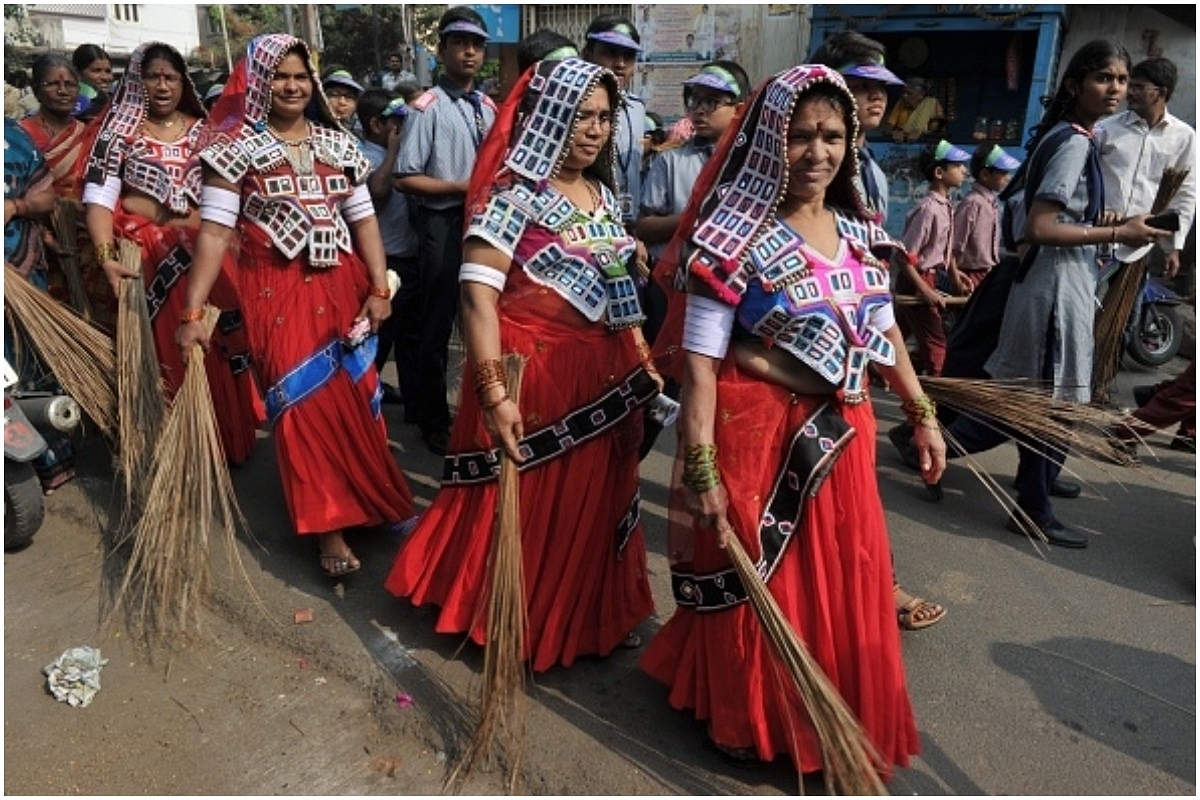News Brief
Central Government Launches Rs 4.4 Lakh Crore Worth Schemes To Make Indian Cities Garbage-Free And Water-Secure
- The Swachh Mission is expected to focus on ensuring complete access to sanitation facilities to serve the additional population migrating from rural to urban areas in search of employment and better opportunities over the next 5 years.

Women with broomsticks.
With the aim of making cities garbage-free and water safe along with increasing sewage and septic management, the Union Government has launched schemes worth Rs 4.4 lakh crore.
Focusing on sustaining sanitation and solid waste management
while ensuring water supply to all households in around 4,700 cities, Prime Minister Narendra Modi has launched the second phases of Swachh Bharat Mission-Urban (SBM-U) and Atal Mission for Rejuvenation and Urban Transformation (AMRUT).
The Swachh Mission is expected to focus on ensuring complete access to sanitation facilities to serve the additional population migrating from rural to urban areas in search of employment and better opportunities over the next 5 years.
This will be done through the construction of over 3.5 lakh individual, community and public toilets.
Special focus will be put on the well-being of sanitation and informal waste workers, through provision of personal protective equipment and safety kits, linkages with government welfare schemes along with their capacity building.
A financial outlay of Rs 1,41,600 crore has been finalised for SBM-U 2.0, including central share of Rs 36,465 crore for the period 2021-22 to 2025-26 which is over 2.5 times the financial outlay of Rs 62,009 crore in the last phase of the Mission.
Complete liquid waste management in cities with less than 1 lakh population — a new component introduced under SBM-Urban 2.0 — will ensure that all wastewater is safely contained, collected, transported and treated so that no wastewater pollutes our water bodies.
Under the Sustainable Solid Waste Management, greater emphasis will be on source segregation. Material Recovery Facilities, and waste processing facilities will be set up, with a focus on phasing out single-use plastic.
Construction and demolition waste processing facilities will be set up and mechanical sweepers deployed in National Clean Air Programme cities and in cities with more than 5 lakh population.
Remediation of all legacy dumpsites will be another key component of the Mission.
The total outlay of AMRUT 2.0 is Rs 2,97,000 crore including central share of Rs 76,760 crore. This includes Rs 10,000 crore Central share and another Rs 10,000 crore states’ share for continuing financial support to AMRUT Mission up to March 2023.
The objective of AMRUT 2.0 is to provide 100 per cent coverage of water supply to all households in around 4,700 cities and towns by providing 2.68 crore urban household tap connections, thereby benefiting around 10.7 crore people.
It will provide 100 per cent coverage of sewerage and septage in 500 AMRUT cities, by providing 2.64 crore sewer connections/septage connections, thereby benefiting around 10.6 crore people.
Rejuvenation of water bodies and urban aquifer management will be undertaken to augment sustainable fresh water supply. Recycling and reuse of treated wastewater is expected to cater to 20 per cent of total water needs of the cities and 40 per cent of industrial demand.
Under the Mission, fresh water bodies will be protected from getting polluted to make natural resources sustainable.
There will be several defining features of AMRUT-2.0. These include upscaling from 500 cities covered under AMRUT with 1 lakh+ population to all 4,372 cities, covering 100 per cent urban India.
It will promote the circular economy of water through formulation of the City Water Balance Plan for each city, focusing on recycling/reuse of treated sewage, rejuvenation of water bodies and water conservation.
The digital economy will be promoted through a Paperless Mission. Pey Jal Survekshan will be conducted in cities to ascertain equitable distribution of water, reuse of wastewater and mapping of water bodies.
The Prime Minister also referred to street vendors and hawkers as one of the most important partners of any city in the programme related to urban development.
The Prime Minister reiterated that PM Svanidhi Yojana has come as a new ray of hope for these people.
Introducing ElectionsHQ + 50 Ground Reports Project
The 2024 elections might seem easy to guess, but there are some important questions that shouldn't be missed.
Do freebies still sway voters? Do people prioritise infrastructure when voting? How will Punjab vote?
The answers to these questions provide great insights into where we, as a country, are headed in the years to come.
Swarajya is starting a project with an aim to do 50 solid ground stories and a smart commentary service on WhatsApp, a one-of-a-kind. We'd love your support during this election season.
Click below to contribute.
Latest